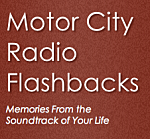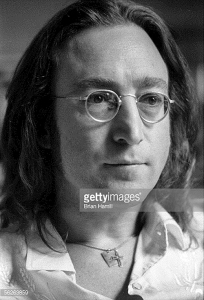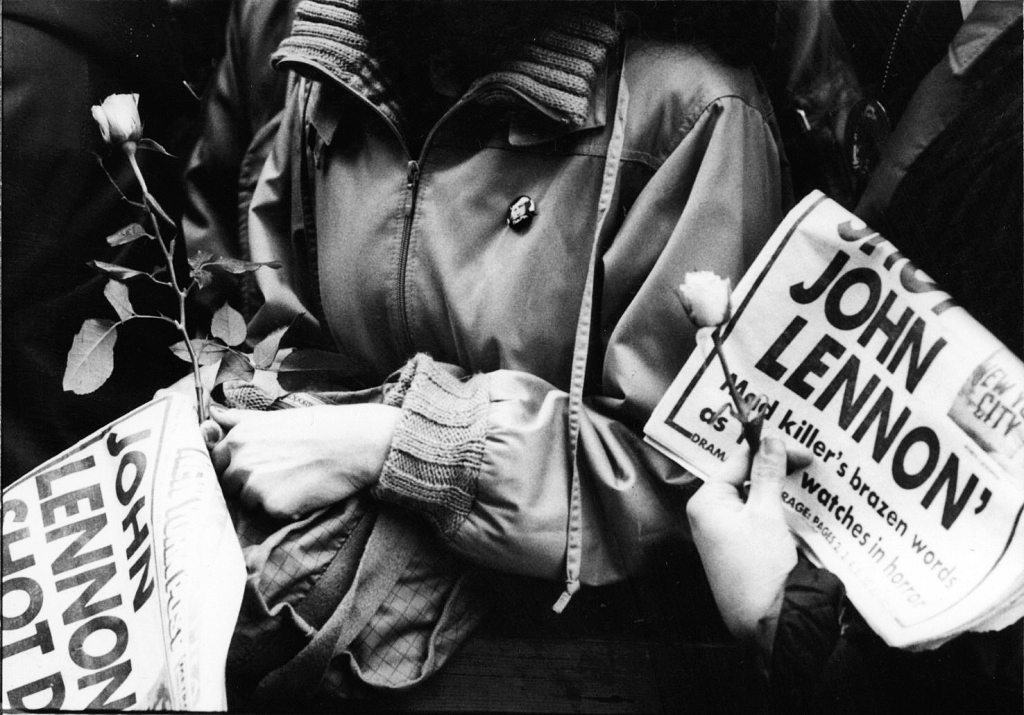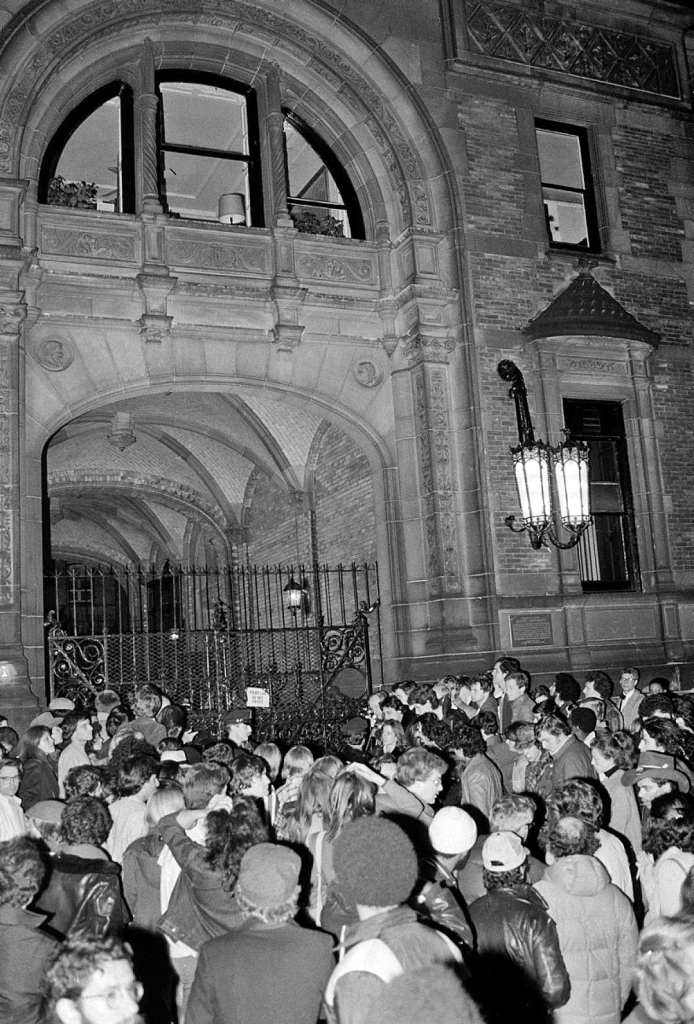 From the MCRFB NEWS archive: 1980
From the MCRFB NEWS archive: 1980
U. S. PRESS, RADIO AND TV, SATURATED WITH NEWS OF LENNON ASSASSINATION
LOS ANGELES — John Lennon’s death exploded into a major media event, surpassing broadcast and print coverage given to Elvis Presley in 1977 and throwing a dark shadow over other gloomy world events.
There was no way to escape the attention the media gave Lennon’s assassination. And in a grisly way the coverage of the ex-Beatle’s untimely death by a handgun outside his Dakota apartment in Manhattan Monday
(December 8) evening resulted in a rush on record shops around the world the next day and through the week to buy his newest and last LP plus catalog titles by the Beatles.
Lennon’s death became the lead story over and over again with news organizations scrambling to find music industry people to talk on camera about Lennon.

And the irony of Lennon’s having taped an interview just eight hours before his death for RKO Radio resulted in some advance playing of the interview around the country ahead of its pushed up Sunday (December 14) airing.
A Warner Bros. official stated on an independent L.A. television station that Lennon had 22 songs ready for another LP before going on tour. And David Geffen, head of the label for whom Lennon recorded his first effort in five years, was quoted on a CBS -TV News special titled, “John Lennon: The Dream Is Over” Tuesday (December 9) evening that he felt Lennon’s message in this album, “Double Fantasy,” was centered around his family and love. “It was very tender,” Geffen said.
Lennon was reported as ready to apply for U.S. citizenship next year. Those in the know were quoted as saying he relished the ability to walk around the streets of Manhattan without any incident. And in one taped interview the composer comments how wonderful it is to “be able to go into a restaurant in New York and not be bothered by anyone.” That was impossible in England, he said to a British disk jockey during an interview played on U.S. national TV.
All three networks aired specials Tuesday at 11:30 p.m., providing the visual impact of the man, his music and his influence on people to close out a day which had seen as much airplay for Lennon’s music on the radio as during the halcyon days of the mid 1960s when the Beatles would have anywhere from one to five singles on the best selling charts.
The reaction of Lennon’s fans produced strong visuals for the media: people standing in the rain outside the Dakota apartment house; upwards of 2,000 people at a candle light memorial in Century City in L.A. put together by KLOS-FM and KABC-AM, both ABC owned stations.
Early clippings of the Beatles playing at the Cavern in Liverpool made all the network specials Tuesday. Tom Snyder’s “Tomorrow” show on NBC -TV replayed an earlier interview with Lennon Tuesday. ABC -TV’s “Nightline” show went beyond the normal John Lennon background story to delve into the
subject of gun control. President-elect Ronald Reagan, in a separate instance, noted he didn’t believe Federal gun control was the answer.
People inspired by Lennon’s music commented on camera their pain was linked to the death of John F. Kennedy. “Why do those people who are linked to peace die so violently ?” was a common theme. Some commentators made mention of the fact that many of today’s college age students were too young to have lived through the Beatles ’60s era, but had gotten into Lennon’s music at a later date.
While many people spoke of Lennon’s concern for loving humanity, there were others who found other emotions in his music. As one teary eyed girl said in L.A., clutching her newly purchased Lennon /Ono LP for the TV camera: “You can hear the misery and emotion of teenagers in his music.” “He made you think,” responded a man holding a candle in Century City.
Jack Douglas, the producer of his Geffen LP, commented on CBS -TV
that Lennon’s statement was “how important family is.” To many young people, even those in their 30s who had gone through the anti -Vietnam war protests with Lennon, he was indeed part of their philosophical family.

And although he brought a toughness, irony and intellectual abrasiveness to his music, Lennon was still a realist about life, as witness this comment broadcast on a network special which replayed a 1969 conversation in which he was asked how he would act if he ran into someone aggressive on the streets: “I believe in running away to live another day,” Lennon parried. “I might talk to him while I was running, though, `hey, peace brother.’ “
In L.A. broadcasters who had known Lennon were important interview subjects. B. Mitch Reed spoke on KABC-AM with host Michael Jackson and later on several local newscasts about his suffering over the news. Casey Kasem was filmed by KNBC-TV redoing the intro to Lennon’s hit single, “Starting Over,” for his “American Top 40” radio program.
In New York Jonathan Schwartz of WNEW-AM offered his own insight into Lennon’s mystique for CBS-TV viewers.
Singer /poet Ron McKuen commented on L.A. TV that Lennon “helped older people understand what was not a nice thing.”
And in London, George Harrison called the killing “the ultimate robbery.” So while newspapers, published banner headlines about the crime and radio DJs spoke mournfully to their listeners (in some cases for television news crews), cash registers were clicking all over the world. Commented Ray Avery, a Glendale, Calif., dealer Wednesday (December 10): “I don’t think there’s a John Lennon record in any store or at any distributor.”
Commerce and grief coexisted. “All you need is love.” END
___
(Information and news source: Billboard; December 20, 1980)

![]()
